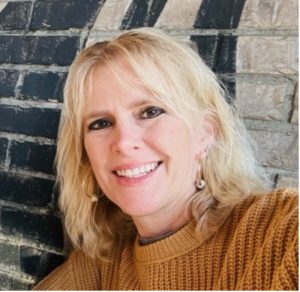Churches and Christian groups often instill in young women character traits that, unfortunately, open the gateway to dating violence and domestic abuse.
By gendering character traits, the church has increased the power of men and the marginalization of women. Patriarchal strongholds have further increased the gap between men and women in both the home and the church.

Geneece Goertzen-Morrison
Differences between healthy and unhealthy relationships are found in the balance of power. With an equitable distribution of power, both parties in the relationship have freedom of choice, speech and movement. One spouse does not dictate to the other. One does not succumb to the other out of social convention or fear. There is gentleness in conversation, fairness in decision-making, and both spouses have equal input into how the relationship develops over the years.
Young women often are expected to act and behave in relationships in a way that removes their power. Without the ability to question authority, make their own decisions and refuse uncomfortable advances, women are left without defenses against predators who seek passive qualities in their prey.
Church as hunting ground
Domestic abusers have admitted that the church is the best place to find a gullible, timid, complacent wife. Abusers know all they have to do is fake an interest in spirituality, say the right things and get involved at church. Young women are taught to value strong male leadership and to watch for men who are committed to God. Then, due to the encouragement of short engagements, these girls are married long before they realize it was all a ruse — only to be told it’s too late and marriage is forever.
“There are cases where abusers are infiltrating our churches and pretending to have a fervent faith.”
What young women are not taught is that there are cases where abusers are infiltrating our churches and pretending to have a fervent faith.
Domestic violence advocates have asserted that targets of abuse are chosen for particular qualities. This is where the teachings of the church come into play. When we teach that girls must be passive, submissive, gentle and meek, we are removing or suppressing their God-given, internal protection. When we teach that boys must always physically take charge and suppress their emotions, we are ignoring the New Testament teachings about servant leadership, the first being last and the fact that even Jesus wept.
The character patterns we establish early are carried with us for life. This is important because toxic patterns lead to lifetime entitlement for boys and subservience for girls. Both become more entrenched in traditional (patriarchal) marriages.
Defining domestic violence
Most people cannot adequately define domestic violence, believing it has to be physical to be abusive. Abuse is so much more than black eyes and broken bones. It is also intimidation, manipulation, humiliation, isolation, threats, insults, force and even using Scripture against another person.
The National Domestic Violence Hotline defines abuse as patterns of coercive behavior used to maintain control in an intimate relationship. Using this definition, we can better understand not only physical abuse, but also emotional, verbal, financial, sexual and spiritual abuse.
Abhorring abuse seems like a relatively simple concept, particularly if we consider the many warnings in Scripture about anger, hatred and violence. This is a subject God has a lot to say about, and a quick look at the word “violence” in Scripture reveals the antithesis of the life of charity Christians ought to display. But how many speak up when hatred and violence are perpetrated against a spouse? Many choose to look the other way rather than get involved in the personal lives of those around them.
The statistics
Abuse is carried out in secrecy and often behind closed doors. Those who are subjected to abusive behavior often are warned to keep silent, frequently with threats of harm. One in four women and one in nine men experience severe abuse from a partner.
The statistics show that 20 people per minute are physically abused. Domestic violence hotlines receive more than 20,000 phone calls per day. Abuse happens within religious families just as it does in those who are not religious. Every congregation across America has individuals who have been affected by abuse — whether that be themselves or someone they are close to.
“None of these survivors have reported that staying and praying cured the abusive marriage.”
I have spoken to many victims and survivors of abuse who said their church’s response to their abusive marriage encouraged them to stay, pray and submit. None of these survivors have reported that staying and praying cured the abusive marriage.
These victims reported that their faith was used to groom them before marriage and used against them after marriage. The change in behavior after the wedding creates confusion for victims, a confusion that is compounded when victims are told the abuse is their fault, or when they are told the abuse is part of God’s will for their lives.
A proposal
What am I proposing with this article? That we stop teaching Christian ideals? Of course not! There are tenets of the faith we want to see, but we want to see them in everyone. We want to see men put on compassion, kindness, humility, gentleness and patience (Colossians 3:12) and for women to be strong in the Lord (Ephesians 6:10). If we are teaching girls to be innocent as doves (Matthew 5:16) the whole verse needs to be taught so that they are also as wary as serpents, and we need to acknowledge out loud that sometimes the wolves are in our own congregations.
Churches have a unique opportunity to shape or respond to these patterns. Premarital counseling should include discussions of domestic violence. Discussing abuse in premarital counseling tells abusers that pastors are watching for toxic behavior patterns and tells victims the door is open for them to return (alone) if they ever need to speak about abuse.
Patterns of toxic behavior should be called out as unacceptable. Gentle compassion and strength should be encouraged in both partners. It is much easier to discuss assault and other forms of abuse before marriage than after.
Secular society responds better to domestic violence than the church does. As people of faith, we cannot pretend abuse doesn’t exist. Why are victims condemned to stay in abuse? Why are the warnings about evil not applied to marriage? Have we ever stopped to consider that God loves and cares for the abused individual more than the institution of marriage?
Those who have experienced abuse need to see that their communities of faith are willing and able to participate in helping them find safety and healing.
Let us be the kind of Christians who surround victims and survivors of abuse with love, compassion, understanding, support and goodwill. Healing happens best within a caring faith community that understands the complexities of recovery after abuse.
October is Domestic Violence Awareness Month. There is no better time to start than now.
Geneece Goertzen-Morrison is an MDiv/LMSW graduate from Baylor University’s Truett Seminary and Garland School of Social Work. As a survivor of more than two decades of abuse, her passion for ministry includes the intersection of faith and practice, particularly on the subject of domestic violence. Find her at HopeRiseThrive.com and @HopeRiseThrive on Facebook and Instagram.
Related articles:
What does complementarianism have to do with Domestic Violence Awareness Month? | Analysis by Rick Pidcock
The seeds of evangelical angst over gender and sex were sown decades ago
Why do we still wonder when violence happens? | Opinion by Kathy Manis-Findley
Why can’t churches get handling abuse right? | Analysis by Susan Shaw


